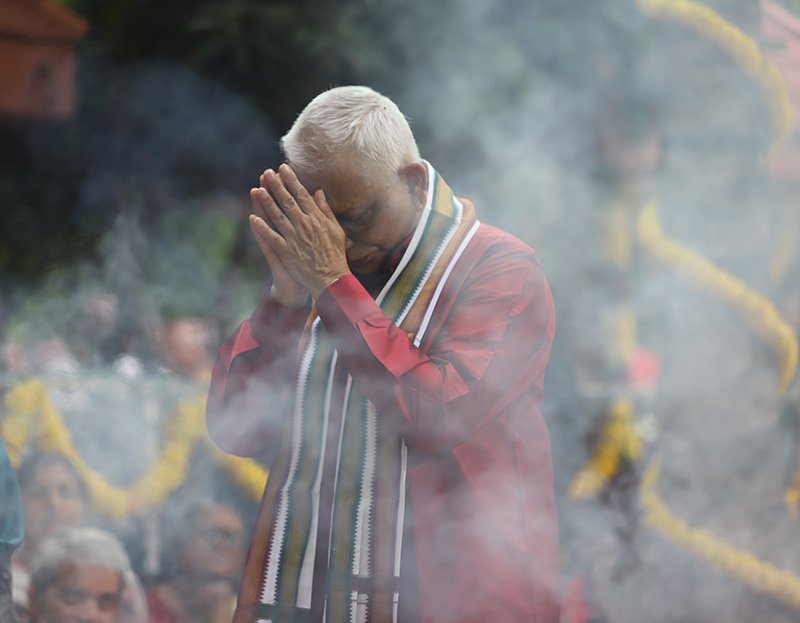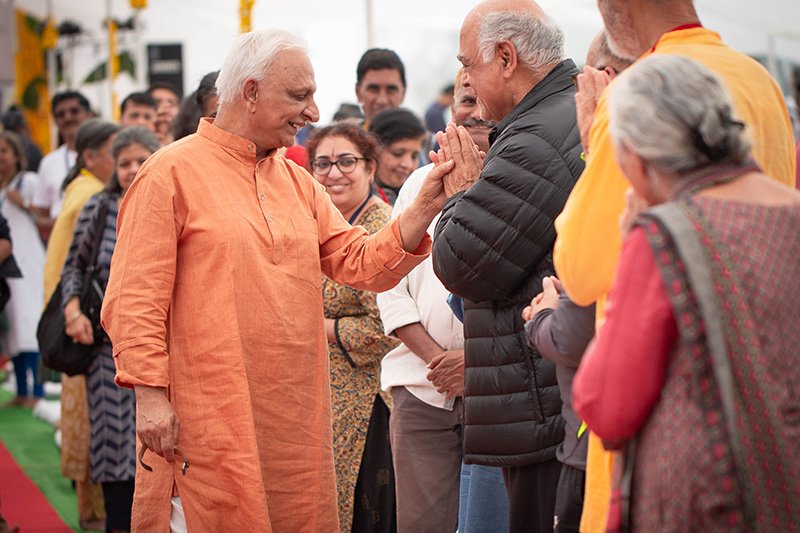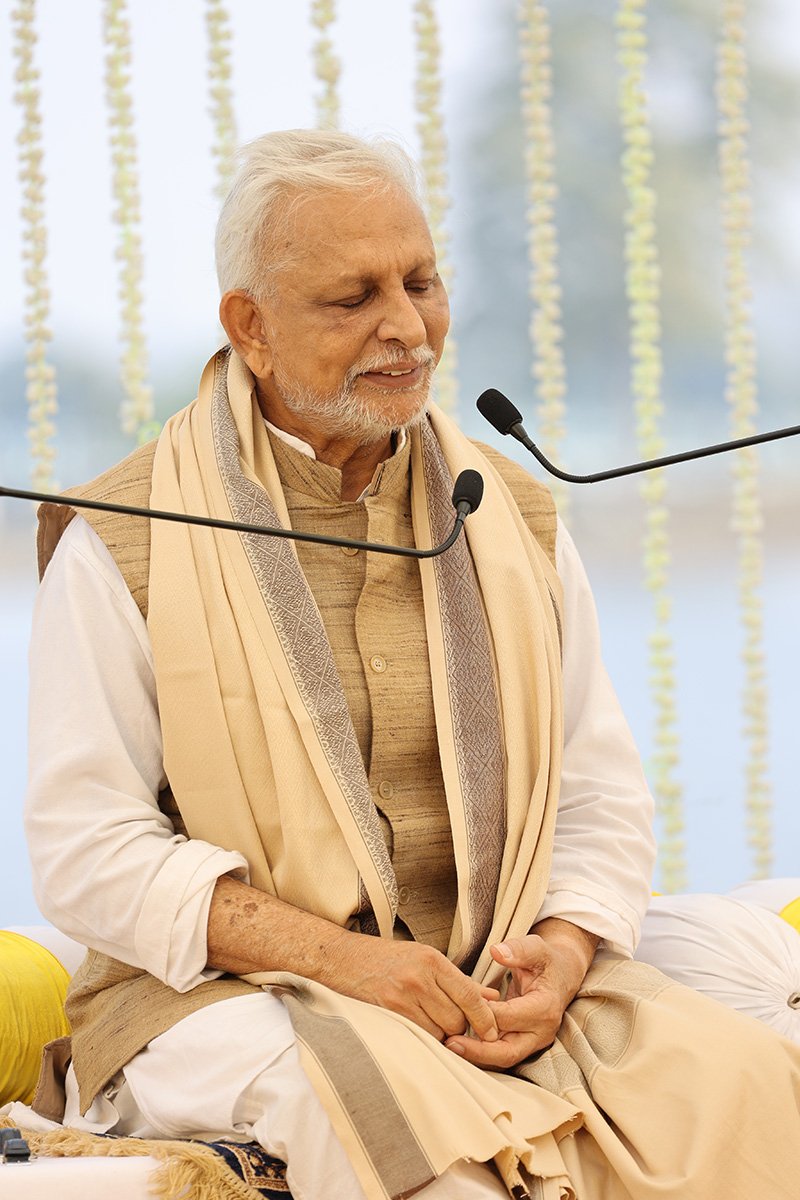
Here, one is talking about surrender in the spiritual field.
Krishna has also talked about surrender, but in the actual field of action, in the Kurukshetra war, he asks Arjuna not to surrender his weapons but to take them up and fight because he is doing a rightful battle to protect dharma; therefore he says surrender unto me. So, when we talk about surrender, we are not talking about surrendering to any temporal forces. In fact if you surrender to temporal forces, you will not be able to turn to spirituality at all.
On one hand there is a battle going on in us which is aimed at defeating the temporal forces that take us away from the spirit. On the other hand when we mean surrender, it’s not to surrender to the forces that are tempting you or acting as obstacles to your spiritual path.
Surrender comes from the understanding that however much we intellectualize, whatever we may do with our limited intelligence, which is the brain, we cannot touch the divinity unless the mind says, “Now I can do nothing more, let me surrender.”
It’s not to do with our temporal affairs at all. It’s to do with the mind after trying to catch God in all directions, finally deciding that, “This is not in my hands now. Let me pray for grace.”

It will come only with great humility, otherwise there are people who do tapasya for a hundred years hoping to find God, but they don’t. They get some siddhis, some powers. You will see that in the puranas and then when they finally surrender, God reveals himself.
That is meant by surrender and for that I think grace is required. Without grace one cannot even surrender, it’s impossible. In fact, I would go to the extent of saying that when a person has put in years of effort and sincere one-pointed effort to find his God or his truth, has been rewarded by bestowing grace by the lord so that he even turns towards the spiritual goal.
There are millions of people on this earth who are doing so many things, who work for a living, but how many really want to go into a serious search for the divine? Few. It’s not that the other people are not intelligent. Many of them are very intelligent. But they have not evolved to the extent where they can turn to this. That requires grace. In fact to surrender to the spiritual, one has to be a true warrior in the temporal and fight a battle because it is a constant battle. And if you surrender, you get help to fight the battle.
You know Krishna has another name which is usually used in Gujarat and Rajasthan, called Ranchchod – one who runs away from the battlefield. Now you may think on the face of it, that it’s a contradiction because here is someone who tells Arjuna, “Take up your bow.” And then he is called Ranchchod because he ran away when Jarasandha came. It’s a very symbolic thing. It means that people sometimes do stupid things thinking that they are very brave. Stupidity is not bravery. Krishna is acting. He knows what is going to happen in the end. Therefore he has to adopt a strategy to achieve that.
‘Dharma kshetre kurukshetre samveda ahiutsavaha’ the shloka starts like that in the Gita. So dharmakshetra, the field where this fight is going on between righteousness and unrighteousness, between material pleasures and enjoyments and internal enjoyment of the spiritual; this constant battle that goes on, can be resolved only (kshetra, here also means the human body with its field operating around it) when you can leave this body, when you completely disregard and think that, “I am not this body but I am something else” which in yogic terminology may also mean that you are able to leave your body at will, which of course, one cannot believe unless one experiences.
That is the meaning of Ranchchod – To abandon this field of activity and turn inward. It is not admitting defeat. It is, understanding that all this circus is finally not going to solve the problem, so let me keep quiet and in that quietness may be the divine reveals itself.

After all, the Yoga Sutras of Patanjali by definition say, ‘Yogas chitta vritti nirodah’. When all the vrittis or disturbances of this field called the mind are removed, then when the mind becomes placid and quiet then that is the take off point for the soul towards its spiritual journey.
It was a big battle for me to surrender to my master because by nature I was quite rebellious and doubtful about things, quite skeptical. Not now, but I was. And even running away from home was a big rebellion. I just ran off. At one time I was very mischievous and my father used to sometimes physically discipline me. One day I looked at him after the disciplinary act and said, “Is that enough or do you want to do more?” He stopped from that day. So, I was like that. And then I went. Of course, I had met Babaji already when I was a small boy. It was only for five minutes.
I met him in the Himalayas after many years, when I was nineteen and a half. I was with him for three and a half years, continuously. He was a barefoot man with no banner, no organization, and no place to rest his head. He would go and stay in some cave or some village and he only had a kamandalu in his possession. He didn’t even have footwear and he had just one piece of cloth and he never got into a vehicle. He said, “Because I don’t have a fixed agenda, I am not in a hurry to go anywhere.”
I travelled with him and it took me more than one year actually to fully understand that whatever I can think, the highest I can think is still limited when compared to what he can think. Then, I started recognizing the superiority of his thought process which seems to have been completely overhauled by his spiritual experience. I decided that in certain things, at least in spiritual matters I should suspend my battle and give up and see what happens.
And what happened is extraordinary. It was not so much verbal teaching as to sit with him and feel and in a year’s time, generally, before he said something I would respond the same. I found that if he wanted water, the thought would arise in his mind and I would go and get water. He tried me out like that for another six months and then he said, “Ab tum taiyyar ho gaye.”
So that is how I did it after a great deal of argument and tests and so many things. In fact, sometime now in retrospect I regret and sometimes I think, “How stupid I was that I should have said things like that?” Not disrespectfully, but wanting to know and being a little overly critical about matters. But I did manage because you’ll see therefore it is so important to live with a person. This is the old tradition that you live with a teacher for sometime before you figure out what’s happening.
You begin to realize the inner dimensions, which are so advanced and begin to look at yourself and see how limited you are and then you open up and see how your mind also goes from the limited, or moves towards from the limited to the unlimited. As it progresses, your mind becomes more and more expansive and is able to embrace everything and everybody without finding faults, which is what I think happened in Babaji’s case.
I thought I was almost worthless, but he polished me up, washed me, dipped me in the water many times; hit the cloth on the rock, cleaned it up and then dried it and ironed it and said, “Now, here you are.” But for that you require to surrender yourself to that person and it took me a long time.
-Sri M
